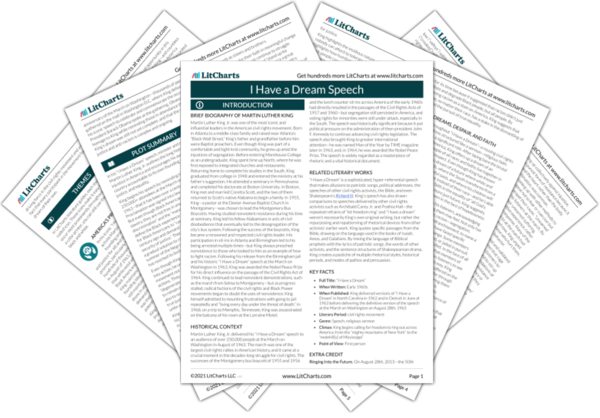In “I Have a Dream,” Martin Luther King Jr. calls out the “shameful condition” of racism in America and demands an end to the indignity of segregation. But he acknowledges that his dream of a free, fair America—a place where Black Americans are judged not “by the color of their skin but by the content of their character”—is one that can’t be realized without solidarity from white Americans. The only way to fight against the “vicious” and divisive nature of racism, King argues, is for Americans of all races to stand together and fight for justice.
King highlights the insidious nature of racism, suggesting that nobody can afford to tolerate it any longer. For instance, King highlights how humiliating segregation is to Black Americans. Black people cannot stay in certain hotels and motels, they are the targets of police brutality, they are confined to “slums” and “ghettos,” and some cannot vote (while others feel that have “nothing for which to vote”). To King, segregation isolates Black Americans in a “dark and desolate valley.” By using language associated with confinement and isolation, King shows that the effect of segregation is not “separate but equal”—it’s akin to exile. Furthermore, King uses language associated with heat and suffocation to show how oppressive racism is both physically and emotionally, and to suggest that race relations in America have reached a kind of boiling point. “The heat of injustice” is “sweltering” and intolerable, he says, and if things don’t change quickly, there will be terrible consequences: America will become trapped in hot “quicksand” from which it might never escape.
King urges Black and white Americans alike to set aside their differences and acknowledge that the fight against racism cannot be won without collaboration. At many points in his speech, King speaks directly to Black Americans, asking them not to let their quest for justice lead to “a distrust of all white people.” After all, there are “many […] white brothers” who have come to the March on Washington after realizing that white Americans’ freedom is “inextricably bound” to that of Black Americans. According to King it is not Black Americans who need the help of white Americans to win freedom from racism and injustice, but instead that white Americans need to help free Black Americans from “the manacles of segregation and the chains of discrimination” in order to be truly free themselves. As long as even one group of people is oppressed, King’s words suggest, no one can truly be liberated.
King also uses his speech to speak directly and specifically to white Americans. He urges his white listeners to see that Black Americans “cannot walk alone” in their long struggle against racism. By encouraging a “biracial army” to rise up against “the battlements of injustice,” King signals to the white members of his audience that they must stand up for their Black comrades in order to affect any real change. King wants his white listeners to see that they must learn to “work together, to pray together, to struggle together, to go to jail together” with their Black brethren. There will be no change if white Americans do not themselves on the line in pursuit of Black liberation. Black Americans are punished harder and more unfairly than white Americans—and so it is up to white Americans, who carry social privilege, to stand in solidarity until true freedom is won.
It is only after Americans of different races stand together, King argues, that all Americans will truly be “free at last.” King’s assertion that white Americans will not be free until all Americans are free from racism and segregation was a radical one for its time because it suggested that racism didn’t just humiliate and degrade Black people, but all people. By positioning racism as a stain on America, King suggests that everyone, no matter their race, has a stake in the dismantling of racism and the pursuit of true equality.
The Collective Fight Against Racism ThemeTracker

The Collective Fight Against Racism Quotes in I Have a Dream Speech
Let us not seek to satisfy our thirst for freedom by drinking from the cup of bitterness and hatred. We must forever conduct our struggle on the high plane of dignity and discipline. We must not allow our creative protest to degenerate into physical violence. Again and again we must rise to the majestic heights of meeting physical force with soul force.

Unlock explanations and citation info for this and every other I Have a Dream Speech quote.
Plus so much more...
Get LitCharts A+The marvelous new militancy which has engulfed the Negro community must not lead us to a distrust of all white people, for many of our white brothers, as evidenced by their presence here today, have come to realize that their destiny is tied up with our destiny and they have come to realize that their freedom is inextricably bound to our freedom.
You have been the veterans of creative suffering. Continue to work with the faith that unearned suffering is redemptive.
Go back to Mississippi; go back to Alabama; go back to South Carolina; go back to Georgia; go back to Louisiana; go back to the slums and ghettos of the northern cities, knowing that somehow this situation can, and will be changed. Let us not wallow in the valley of despair.
So I say to you, my friends, that even though we must face the difficulties of today and tomorrow, I still have a dream. It is a dream deeply rooted in the American dream that one day this nation will rise up and live out the true meaning of its creed—we hold these truths to be self-evident, that all men are created equal.
With this faith we will be able to work together, to pray together, to struggle together, to go to jail together, to stand up for freedom together, knowing that we will be free one day.











